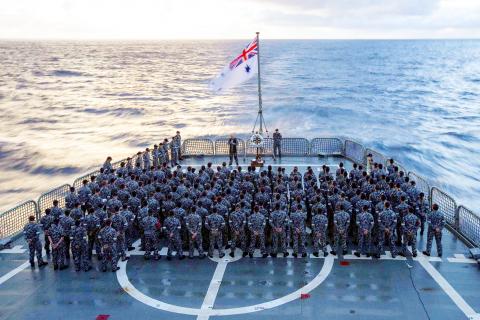Chances of finding floating debris from a missing jetliner are highly unlikely and a new phase of the search will focus on a far larger area, Australian Prime Minister Tony Abbott said yesterday.
The search effort for Malaysia Airlines flight MH370, which vanished on March 8 with 239 people on board, has so far failed to turn up any trace of wreckage.
Abbott said efforts would shift away from visual searches conducted by planes and ships and toward underwater equipment capable of scouring the Indian ocean floor.

Photo: Reuters
He said it was possible nothing would ever be found.
“We will do everything we humanly can, everything we reasonably can, to solve this mystery,” he said.
Malaysia, China, Japan, New Zealand, South Korea, Britain and the US are assisting Australia.
It remains unclear what caused the Boeing 777 to veer off course and disappear from radar.
Malaysian authorities have still not ruled out mechanical problems, but say that the evidence suggests it was deliberately diverted from its route.
Malaysia is under pressure to determine what happened.
The empty expanse of water northwest of Perth is one of the most remote places in the world and one of the deepest.
Authorities had been focusing on a 10km2 stretch of seabed about 3,200km from Perth, after detecting what they suspected was a signal from the plane’s black box recorder on April 4.
The US Navy’s Bluefin-21 underwater drone searching the seabed has failed to turn up any sign.
“We are still baffled and disappointed that we haven’t been able to find undersea wreckage based on those detections,” Abbott told reporters.
Abbott said that the new search area, which spans 700km by 80km could take between six and eight months to examine.
The operations have been handled primarily as a military operation, but Abbott said that one or more commercial companies would be hired by Australia and Malaysia to handle the next phase.
“We haven’t found anything anywhere that has any connection to MH370,” said Angus Houston, head of the Australian agency coordinating the search effort.

With much pomp and circumstance, Cairo is today to inaugurate the long-awaited Grand Egyptian Museum (GEM), widely presented as the crowning jewel on authorities’ efforts to overhaul the country’s vital tourism industry. With a panoramic view of the Giza pyramids plateau, the museum houses thousands of artifacts spanning more than 5,000 years of Egyptian antiquity at a whopping cost of more than US$1 billion. More than two decades in the making, the ultra-modern museum anticipates 5 million visitors annually, with never-before-seen relics on display. In the run-up to the grand opening, Egyptian media and official statements have hailed the “historic moment,” describing the

SECRETIVE SECT: Tetsuya Yamagami was said to have held a grudge against the Unification Church for bankrupting his family after his mother donated about ¥100m The gunman accused of killing former Japanese prime minister Shinzo Abe yesterday pleaded guilty, three years after the assassination in broad daylight shocked the world. The slaying forced a reckoning in a nation with little experience of gun violence, and ignited scrutiny of alleged ties between prominent conservative lawmakers and a secretive sect, the Unification Church. “Everything is true,” Tetsuya Yamagami said at a court in the western city of Nara, admitting to murdering the nation’s longest-serving leader in July 2022. The 45-year-old was led into the room by four security officials. When the judge asked him to state his name, Yamagami, who

‘CHILD PORNOGRAPHY’: The doll on Shein’s Web site measure about 80cm in height, and it was holding a teddy bear in a photo published by a daily newspaper France’s anti-fraud unit on Saturday said it had reported Asian e-commerce giant Shein (希音) for selling what it described as “sex dolls with a childlike appearance.” The French Directorate General for Competition, Consumer Affairs and Fraud Control (DGCCRF) said in a statement that the “description and categorization” of the items on Shein’s Web site “make it difficult to doubt the child pornography nature of the content.” Shortly after the statement, Shein announced that the dolls in question had been withdrawn from its platform and that it had launched an internal inquiry. On its Web site, Le Parisien daily published a

DEADLY PREDATORS: In New South Wales, smart drumlines — anchored buoys with baited hooks — send an alert when a shark bites, allowing the sharks to be tagged High above Sydney’s beaches, drones seek one of the world’s deadliest predators, scanning for the flick of a tail, the swish of a fin or a shadow slipping through the swell. Australia’s oceans are teeming with sharks, with great whites topping the list of species that might fatally chomp a human. Undeterred, Australians flock to the sea in huge numbers — with a survey last year showing that nearly two-thirds of the population made a total of 650 million coastal visits in a single year. Many beach lovers accept the risks. When a shark killed surfer Mercury Psillakis off a northern Sydney beach last